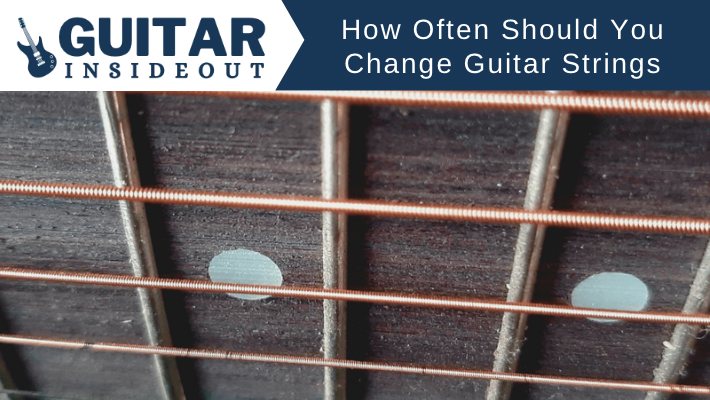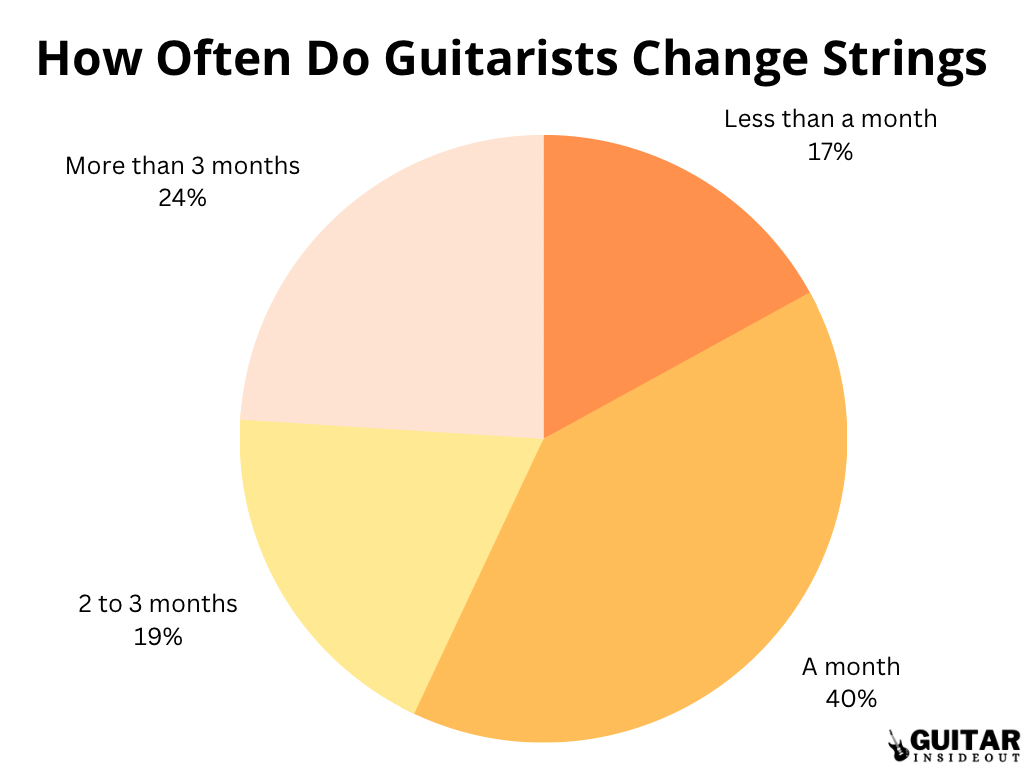When you’ve been playing the guitar for a while you will begin to wonder about changing your strings. You might start thinking whether you need new ones.
What happens when they get old? And how often should you change guitar strings? Simply: 3 months is a good time to change your strings. Even if you don’t play that regularly strings degrade over time so it’s worth replacing them.

The quality of strings has a big effect on how the guitar sounds, feels and how it plays. So changing strings is important.
If you’re not sure how frequently you need to replace guitar strings then keep reading. We will look at when each type of guitar needs restringing, how you know when to change guitar strings, ways to care for and maintain them and more.
How Often Should you Change Guitar Strings
You should change guitar strings when you want to. There isn’t really a set time for when strings need changing because it depends on so many different factors.
The biggest reason for needing to change them is how much they’ve been played. If you’re gigging regularly or play and practice a lot then you will need to change strings more often than someone who only picks up their guitar once a week.
A professional may need to change them every few weeks (or even more!). For most non-professionals though you are looking at a month at the least. Roughly 3 months is a good guide to stick to if you play at home fairly regularly.
I have personally changed my strings less often than 3 months and it’s not been a problem. In fact I tend to go on how they feel, sound and look a lot of the time.
It’s a good idea to judge when you need to change strings based on what you’re hearing and feeling rather than a specific timeframe. Use 3 months as a signpost or reminder to check your strings rather than a rule or something you have to adhere to.
The Average Time Most Guitarists Change Their Strings
I was interested to know if how often I changed my strings aligned with other guitar players. So I looked into how often other guitarists change their strings.
That meant compiling responses from places like Reddit and guitar forums. I took a small sample of 100 people’s responses to Reddit and forum threads about how often they changed their strings and the results were as follows:

| Less Than a Month | A Month | 2-3 Months | More Than 3 Months |
|---|---|---|---|
| 17 | 40 | 19 | 24 |
I found those results a little surprising. The most popular time to change guitar strings was about a month, which didn’t shock me that much.
I think that’s a little too often myself but it’s worth keeping in mind those using and replying to forums and Reddit subs are more likely to be heavily interested in guitars. It’s less likely to be the more casual players, so probably make sense they’d go through strings quicker.
But I was surprised to see more than 3 months as the next most popular. I thought it would definitely be 2-3 months and much closer.
I was also expecting it to be far more consistent. I thought a month or 2 to 3 months would dominate. But it turns out there’s a lot of variation and in the end they were all fairly close.
The thing is though – it’s all a bit useless. I sort of wasted my time compiling all that.
Why? Because how often you change your strings comes down to how often you play your guitar.
Some of the people replying were pro’s or gigging guitarists playing multiple times a week. Others were hobby guitarists only playing at home.
Now, obviously if you play very regularly then you’re going to need to change the strings a lot more frequently. So all in all that’s not a great comparison.
It hasn’t changed my mind about when I’ll change my strings though. But it was nice to see a lot of people who are happy to leave theirs longer than 3 months.
What Else You Need to Consider
So apart from aiming for around 3 months and keeping an eye on how they sound and feel, what else should you consider.
How Often You Play
I touched on this above but it’s probably the biggest factor in how long your strings will last. The more you play then the more frequently the strings will need replacing.
That’s just common sense.
So if you’re a professional or gigging regularly then you may have to change them every few weeks, if not more. For a hobbyist only playing at home or the occasional jam then there’s no real need to change them any more frequently than every few months.
The Type of Strings
There are many different types of strings and some last longer than others. Coated strings for example have a longer life and are better protected from acidic sweat and oils than uncoated ones.
So the type of string you use will play a role in how often you need to change them.

How Many Guitars You’re Playing
If you’re playing and switching between a few guitars then they will all need their strings replacing less often because they’re getting less use. If you only have one guitar or play one guitar much more than others it’s going to need the strings changing far more frequently than if you’re splitting your playing between multiple guitars.
Do You Have Sweaty Hands
Some people produce a lot of sweat or oils from their hands. The strings absorb those oils and sweat which then contributes to their corrosion.
If you have ultra sweaty or oily hands then you may need to replace your strings more often than others. Or at the least make a real effort to wash your hands before playing and wipe the strings down after every use.
You may even have very acidic sweat! In which case you’ll need to take extra care of your strings and really keep them well looked after.
Humidity and Temperature
If you live in a humid environment or the temperature changes a lot and reaches extremes then your strings may rust or break and lose their tone.
You can use a humidifier or keep your guitar in its case to protect it from the humidity and fluctuating temperature.

Playing Style
You can wear strings out faster meaning they’ll need to be changed more often by playing aggressively. If you really attack your strings and find them wearing out too quickly that could be the reason.
Preference
Not everyone likes the same thing. Some guitarists love the feel and sound of brand new strings. Others prefer more worn and broken in strings.
I’ve read about jazz players who much prefer really old strings because of the tone they get from them.
So it comes down to what you like. I’m never as bothered about the sound or tone of older strings but I hate the feel when they’re corroded and grubby. Also, it might just be me but old strings stink, right?
How do you Know if Guitar Strings Need Changing?
There are some clear signs that your strings are in need of a change:
Visible Signs of Wear
If the strings are starting to rust, have become discolored or are fraying then you can be confident it’s time to change them. If they just look bad – covered in dirt or grime – then a good clean should be good enough so that you won’t have to replace them.
Won’t Stay in Tune
When your strings won’t stay in tune then one of the causes can be old or worn out strings. As strings get used and age they lose their elasticity which can result in difficulty staying in tune.
If you’ve got a guitar that never struggled to stay in tune but suddenly develops issues then it could be the strings need changing.
Dull Tone
A loss of tone or your guitar sounding “flat” is a classic sign of the strings needing to be changed. With time and use strings lose the clarity and brightness they have when they’re new and a build up of oils and dirt will also affect how good they sound.
Poor Playability
Over time guitar strings will become sticky or feel rough and even bend or get kinks on them. This will obviously affect how the guitar plays. So if you find your strings are just feeling off and not playing well that’s a clear indicator you need to change them.
Maintaining Your Strings
In order to help your strings last as long as possible and save you having to change them too often (as well as money!) you can do a few things to maintain them. These tips should help extend your strings life:
- Wash your hands before you play – this will reduce the amount of dirt, sweat and oils you pass on to the strings.
- Wipe your strings down after you play – this will keep the strings clean and free of any dirt, dust and sweat/oils that they’ve picked up while you’ve been playing.
- Keep your guitar in its case or get a humidifier – fluctuating temperature and humidity can degrade strings. So keeping them at a constant temperature will make them last longer.